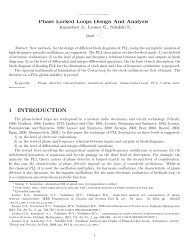Technical Sessions – Monday July 11
Technical Sessions – Monday July 11
Technical Sessions – Monday July 11
You also want an ePaper? Increase the reach of your titles
YUMPU automatically turns print PDFs into web optimized ePapers that Google loves.
TA-<strong>11</strong> IFORS 20<strong>11</strong> - Melbourne<br />
3 - Increasing Stability and Flexibility of Vehicle and Crew<br />
Schedules in Public Transport<br />
Bastian Amberg, Information Systems, Freie Universitaet Berlin,<br />
Garystr. 21, 14195, Berlin, Germany,<br />
bastian.amberg@fu-berlin.de, Boris Amberg, Natalia Kliewer<br />
In public bus transport delays occur frequently during execution of vehicle and<br />
crew schedules. Then planned schedules can become infeasible and the operations<br />
control has to initiate expensive recovery actions. We present offline<br />
approaches to increase robustness of vehicle and crew schedules. In order<br />
to absorb possible delays we propose models and methods increasing delaytolerance<br />
(stability). Further we consider methods providing additional possibilities<br />
for low-cost recovery actions within the schedules (flexibility). The<br />
approaches are compared with regard to planned cost and robustness<br />
4 - Incorporating Stability and Flexibility Aspects in Crew<br />
and Aircraft Scheduling<br />
Lucian Ionescu, Information Systems, Freie Universität Berlin,<br />
Garystr. 21, 14195, Berlin, Germany,<br />
Lucian.Ionescu@fu-berlin.de, Natalia Kliewer<br />
In this talk we discuss robustness aspects of crew and aircraft schedules. The<br />
scope of the talk is two-folded. In the first part we propose an indicator for<br />
stability of crew and aircraft schedules based on a stochastic model for delay<br />
propagation. In a second stage we discuss an extension of the approach by considering<br />
swapping opportunities of crews and aircraft during operations. Swaps<br />
are used to adhere to cost-efficient schedules while still hedging against possible<br />
reactionary delays. This enables us to both consider stability and flexibility<br />
simultaneously during scheduling.<br />
� TA-<strong>11</strong><br />
Tuesday, 9:00-10:30<br />
Meeting Room <strong>11</strong>2<br />
Simulation Optimization<br />
Stream: Simulation - Sponsored by I-SIM<br />
Invited session<br />
Chair: Loo Hay Lee, Industrial & Systems Engineering Dept.,<br />
National University of Singapore, 10 Kent Ridge Crescent, <strong>11</strong>9260,<br />
Singapore, iseleelh@nus.edu.sg<br />
1 - Optimal Computing Budget Allocation (OCBA) Algorithm<br />
for constraint and multi-objective problem<br />
Loo Hay Lee, Industrial & Systems Engineering Dept., National<br />
University of Singapore, 10 Kent Ridge Crescent, <strong>11</strong>9260,<br />
Singapore, iseleelh@nus.edu.sg, Ek Peng Chew, Chun-Hung<br />
Chen<br />
In this talk, we will share some of the new development in OCBA. We have<br />
developed algorithms for constraints optimization problem as well as multiobjective<br />
problem. Correlation information between performance will be considered<br />
in the algorithm.<br />
2 - OCBA Framework for AHP in Supplier Selection Problem<br />
Ek Peng Chew, Industrial and Systems Engineering, Faculty of<br />
Engineering, National University of Singapore, 10 Kent Ridge<br />
Crescent, <strong>11</strong>9260, Singapore, isecep@nus.edu.sg, Loo Hay Lee<br />
In this work, we look at a supplier selection problem using Analytical Hierarchy<br />
Process (AHP). However, as the information is clouded by a lot of uncertainty,<br />
the solution generated by AHP might not be the best one. We propose an<br />
optimal computing budget allocation (OCBA) framework to reduce the degree<br />
of uncertainty in the information efficiently so that solution obtain will meet<br />
the goal of the decision makers with high confidence.<br />
3 - Augmenting Regression with Direct Stochastic Gradient<br />
Estimates<br />
Michael Fu, Smith School of Business, University of Maryland,<br />
Van Munching Hall, 20742, College Park, MD, United States,<br />
mfu@umd.edu, Huashuai Qu<br />
In the sequential response surface methodology approach to simulation optimization,<br />
regression plays a central role. Traditional regression assumes the<br />
only data available are measurements of the dependent variable for each value<br />
of the independent variable. We propose an augmented linear regression model<br />
that incorporates direct stochastic gradient estimates, comparing it with the traditional<br />
model both analytically and numerically on a simple queueing model.<br />
34<br />
4 - Power Management in Buildings Facilitated by<br />
Simulation-based Policy Improvement<br />
Qing-Shan Jia, Department of Automation, Tsinghua University,<br />
CFINS, 100084, Beijing, China, jiaqs@tsinghua.edu.cn,<br />
Jian-Xiang Shen, Zhan-Bo Xu, Xiaohong Guan<br />
Buildings are one of the largest consumers of energy, accounting for between<br />
30-40% of global energy use. In this talk, we schedule solar power, wind power,<br />
combined cooling, heating, and power generation (CCHP), battery, and high<br />
temperature chiller to satisfy the load on electricity, sensible heat load, and latent<br />
heat load in buildings with the minimal average cost. The rollout method<br />
is applied to improve from given base policies through simulations. Numerical<br />
results show that the method obtains policies better than the base policies.<br />
� TA-12<br />
Tuesday, 9:00-10:30<br />
Meeting Room 205<br />
Production Systems<br />
Stream: Contributed Talks<br />
Contributed session<br />
Chair: Kazuyoshi Tsurusaki, Faculty of Economics, Nagasaki<br />
University, 4-2-1 Katafuchi, 850-8506, Nagasaki, Japan,<br />
turusaki@nagasaki-u.ac.jp<br />
1 - A New Production Planning System by Advance Demand<br />
Information Based on Unfulfilled-order-rate for<br />
Uncertain Demand<br />
Nobuyuki Ueno, Dept. of Management Information Systems,<br />
Prefectural University of Hiroshima, 1-1-71 Ujina-Higashi,<br />
Minami-Ku Hiroshima-City, 734-0003, Hiroshima, Japan,<br />
ueno@pu-hiroshima.ac.jp, Koji Okuhara<br />
We propose a production planning model with uncertain demand based on<br />
unfulfilled-order-rate by Advance Demand Information. It is formulated as<br />
a nonlinear stochastic problem which minimizes the sum of production cost<br />
and inventory holding cost subject to a probabilistic constraint and linear constraints.<br />
We develop the new upper bound to estimate unfulfilled-order-rate<br />
when inventory in two periods is correlated and a near-optimal solution algorithm<br />
on the basis of relaxation strategy. The technique decreases inventory<br />
more than by base-stock policy with multi-period under the conditions.<br />
2 - Simulation and Control of Shrinkages in the Ready Mix<br />
Concrete Production Process<br />
Fredy Huayta, Ingeniería Industrial, Pontificia Universidad<br />
Católica del Perú, Av. Universitaria 1801, Lima, Peru,<br />
fhuayta@pucp.edu.pe, Wilmer Atoche, Fernando Ormachea<br />
Article shows the ready-mix concrete production process, which identifies the<br />
shrinkage, generated in the unit operation. Monitoring indicators are identified<br />
and shrinkage, are simulated using computational tools process. Also calculated<br />
the economic losses generated by the shrinkage and the water wasted in<br />
the process. The company analyzed processes 1000 tons per day, in which they<br />
identify points of leakage, we measured the losses generated in the process,<br />
were determined by mass balance calculations, was formulated and finally the<br />
model simulated the losses of the unit operation.<br />
3 - Proposed Improvements in Non Direct Process of a<br />
Socks Company<br />
José Rau, FCI, PUCP, Av. Universitaria 1851, Peru,<br />
jrau@pucp.edu.pe<br />
Improvements presented correspond to an average manufacturing plant, which<br />
showed a low productivity of human and material resources. It were chosen and<br />
described development in reduce consumption of energy resource and increase<br />
productivity, progress in an air system to transport and carry on knitting and<br />
innovation in improving the organization of work and material consumption.




